Lesson 8 | Odds & Ends, Part 1
[1] Conditional Sentences
You have already encountered several conditional sentences in past assignments. Thus far, our point of emphasis has been on recognizing that the conjunctions εἰ and ἐάν establish subordinate clauses. In an “if-then” construction, the conditional if-clause is subordinate to the main then-clause. The order in which the clauses occur does not change this basic structure.
We will now explore conditional sentences in more detail.
Not all conditional sentences are made alike.
Each of the following conditional sentences conveys a subtle point(s) of emphasis.
If it is going to rain, then we had better close the windows.
This sentence implies it is almost assuredly going to rain according to the speaker.
If he was innocent, he would not have concealed the evidence.
In this case, the speaker seems to assume exactly the opposite. That is, the then-clause implies that the subject is not at all innocent—and here’s the proof!
If you go to the store, please pick up some milk.
This sentence leaves the possibility of the subject going to the store entirely open.
Three Classes of Conditional Sentences in NT Greek
Koine Greek has four classes of conditional sentences based on their formal structure. But since there is only one occurrence of a fourth class conditional in the Greek NT, we will only highlight three classes. You do not need to memorize these classes, but you should be alert to them. When you encounter a conditional sentence, you should consider what sort of conditional the speaker is intending. The particular emphasis may not come through in translation. In fact, the best translation may keep the simple “if … then” language and leave the reader to ponder the intent. Nevertheless, the distinctions ought to be clear in your exegesis and teaching.
The primary way to identify each class is by the structural clues:
- conjunctions (εἰ or ἐάν)
- verbal mood (generally, indicative or subjunctive)
- verbal tense
- negation (οὐ or μή, if present)
Let’s first define two important terms:
prot⦁a⦁sis noun The clause expressing the condition in a conditional sentence (the if-clause)
a⦁pod⦁o⦁sis noun The main (consequent) clause of a conditional sentence (the then-clause)
First Class
These are conditions of fact, which are (in the very least) assumed to be true for the sake of argument. “If x is true (and let’s assume for a moment that it is), then y.”
Examples:
εἰ δὲ πνεύματι ἄγεσθε, οὐκ ἐστὲ ὑπὸ νόμον. But if you are led by the Spirit, you are not under the law. ~Galatians 5:18
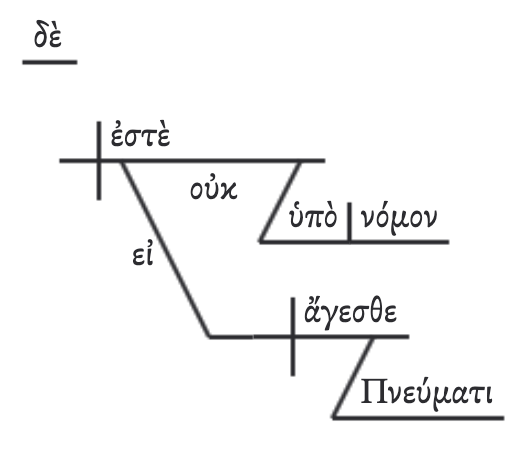
By saying, “if you are led by the Spirit,” Paul is not leaving the question open, as if to say, “Maybe you are, maybe you are not.” He is speaking to the Galatians as believers who are indeed being led by the Spirit. He uses the conditional clause to put weight behind the truth he asserts in the apodosis. Those who are led by the Spirit are not under the law.
εἰ δὲ ἀνάστασις νεκρῶν οὐκ ἔστιν, οὐδὲ Χριστὸς ἐγήγερται But if there is no resurrection from the dead, then not even Christ has been raised. ~1 Corinthians 15:13
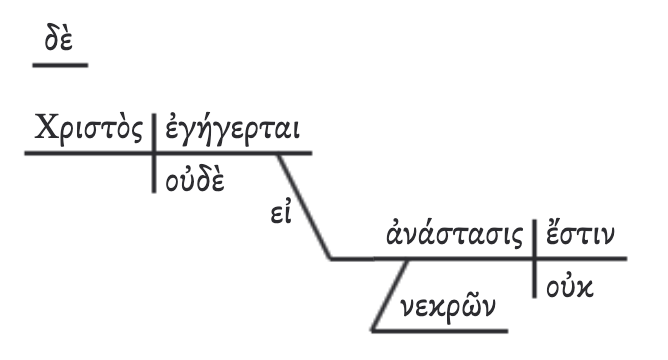
Here is a good example of what we mean by “true for the sake of argument.” The assertion in the protasis does not have to actually be true. In this case, Paul is saying something like, “Let’s assume for a moment that there is no such thing as dead bodies being raised alive from the grave. If that is the case, then not even Christ has been raised!”
εἰ γὰρ πιστεύομεν ὅτι Ἰησοῦς ἀπέθανεν καὶ ἀνέστη, οὕτως καὶ ὁ θεὸς τοὺς κοιμηθέντας διὰ τοῦ Ἰησοῦ ἄξει σὺν αὐτῷ. For if we believe that Jesus died and rose again, even so, God will bring with him those who have fallen asleep through Jesus. ~1 Thessalonians 4:14
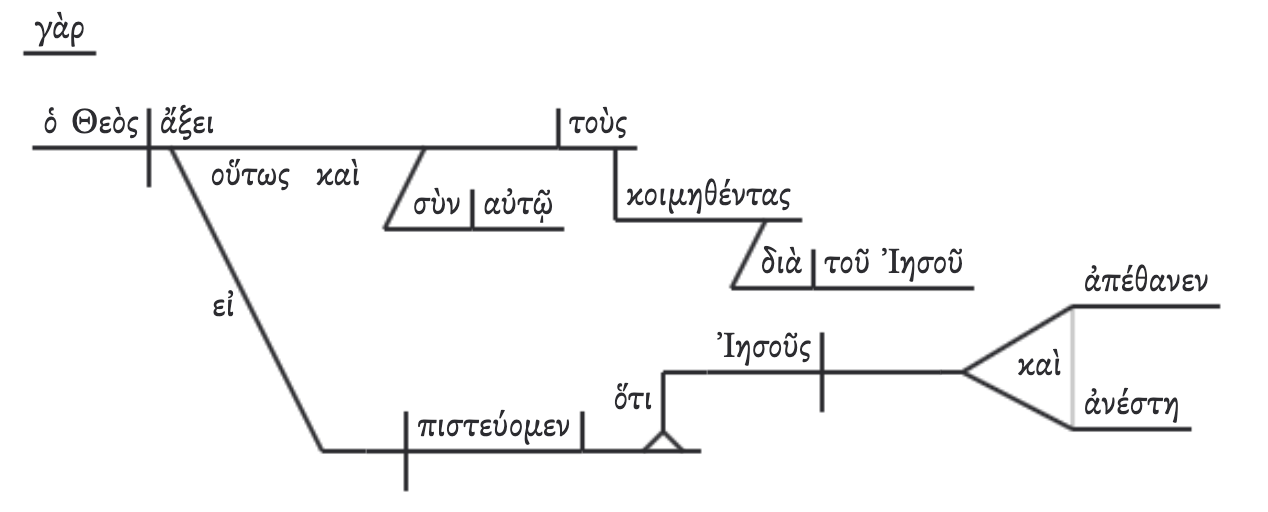
Sometimes the protasis is clearly true, such that we could translate the if-clause, “since x is true, y is in fact true.” To say “if” might convey a sense of uncertainty that is not accurate. The surety of God raising the dead in Christ to resurrection life is not conditioned upon whether we believe it or not. Thus, the ESV translates 1 Thess 4:14 as, “For since we believe that Jesus died and rose again.” On the other hand, translating “since” overstates the case. By using the first class conditional, Paul expresses confidence in the truth, yet does so with a rhetorical punch. “If we believe a to be true—and it certainly is—then we can have confidence that b is also true.” We should not ignore the rhetorical purpose behind an author’s choice to use the conditional sentence. Generally, it is best to translate using “if” and then be clear in our teaching to bring out the appropriate certainty of the protasis.
Second Class
Conditions that are contrary to fact. “If x is true (and we know that it certainly is not), then y would be true.” The conditional clause may express only the speaker’s view: “If x is true (and I do not think it is), then y would be true.”
Example:
εἰ γὰρ ἐπιστεύετε Μωϋσεῖ, ἐπιστεύετε ἂν ἐμοί· For if you believed Moses, you would believe me. ~John 5:46
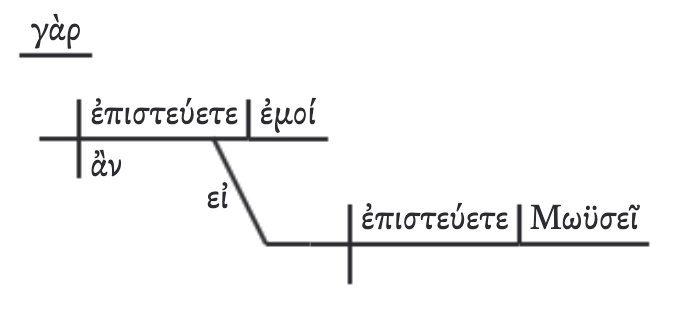
The keys to identifying a second class conditional are: (1) the protasis uses one of the secondary tenses (imperfect, aorist, or pluperfect) in the indicative mood; (2) the apodosis uses the same tense in the indicative; (3) the apodosis (usually) has ἄν.
In John 5:46, Jesus is actually asserting that his hearers did not, in fact, believe Moses, for if they had, they would have believed him.
Third Class
The third class expresses a general condition that may or may not be true. “If x is true (and it may or may not be), then y is true.” Depending on the context, the protasis may be merely potential or even probable.
Examples:
ἐάν τις περιπατῇ ἐν τῇ ἡμέρᾳ, οὐ προσκόπτει If anyone walks in the day, he does not stumble. ~John 11:9
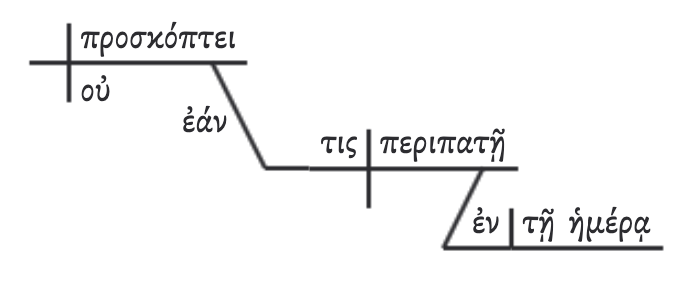
In this example, the condition in the protasis is neither uncertain nor probable. It is simply potential. And if the condition is fulfilled, then the apodosis will, in fact, follow.
Ἔλεγεν οὖν ὁ Ἰησοῦς πρὸς τοὺς πεπιστευκότας αὐτῷ Ἰουδαίους· ἐὰν ὑμεῖς μείνητε ἐν τῷ λόγῳ τῷ ἐμῷ, ἀληθῶς μαθηταί μού ἐστε So Jesus said to the Jews who had believed in him, “If you abide in my word, you are truly my disciples.” ~John 8:31
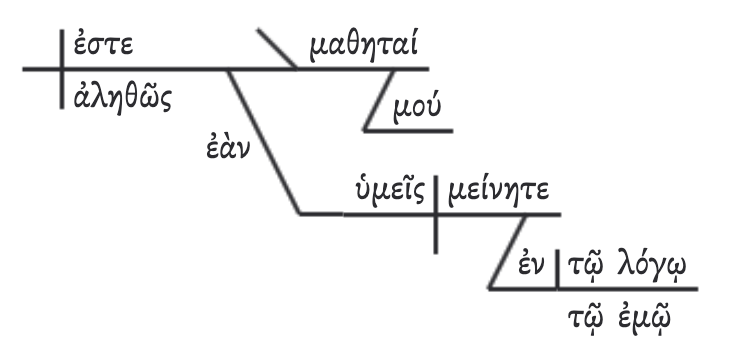
Here, Jesus specifically addresses those who had believed in him when he spoke concerning himself and the Father (see John 8:28–30). For those with genuine faith, the conditional clause, “If you abide in my word,” is not only potential, but probable. Still, by the third-class conditional, Jesus is not making any assumptions about them. His words are both an encouragement and a challenge.